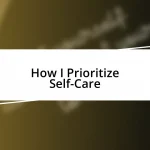Key takeaways:
- Hydration is essential for overall well-being, affecting physical energy, cognitive function, and mood.
- Key benefits of staying hydrated include improved skin health, better digestion, and enhanced mood.
- Signs of dehydration include dry mouth, fatigue, dark yellow urine, headaches, and dry skin.
- Effective hydration strategies include using a reusable water bottle, starting the day with warm lemon water, and pairing water with meals.
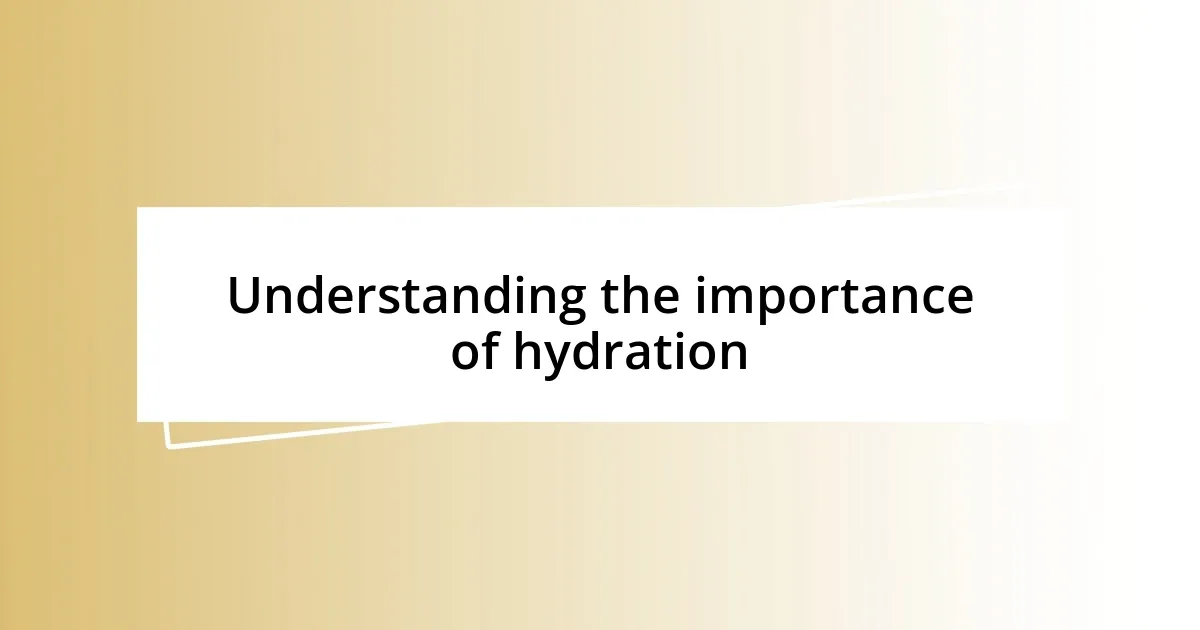
Understanding the importance of hydration
Hydration is not just about quenching thirst; it’s fundamentally tied to our overall well-being. I recall a time when I neglected my fluid intake during a busy work week, only to find myself feeling fatigued and unfocused. Isn’t it interesting how often we overlook something so crucial?
I’ve learned that our bodies are comprised of about 60% water, which highlights just how essential hydration really is. When I’ve stayed properly hydrated, I’ve experienced improved energy levels and sharper focus, making tasks feel less daunting. How has hydration impacted your daily routine?
Moreover, proper hydration is vital for regulating temperature, lubricating joints, and ensuring that nutrients are effectively transported throughout the body. I remember the stark difference in my long runs; during a well-hydrated stretch, I felt like I could conquer any distance compared to my sluggish performance on a dehydrated day. Have you noticed how you perform when you’re well-hydrated versus when you’re not? The disparities can be quite eye-opening.

Benefits of staying hydrated
Staying hydrated brings a wealth of benefits that I continue to discover every day. One of the biggest perks I’ve noticed is how much better my skin looks and feels. When I drink enough water, I can actually see a glow that isn’t there when I’m parched; it’s as if hydration rejuvenates my complexion. Have you ever tried to gauge the difference in your skin’s appearance? It can be quite telling.
Another thing I’ve realized is that proper hydration can significantly improve digestion. I used to experience occasional bloating, which was uncomfortable and frustrating. But since I’ve made it a point to prioritize fluid intake, things have been running much smoother, if you know what I mean. Isn’t it fascinating how something as simple as water can play such a crucial role in our digestive health?
Lastly, I’ve learned that drinking enough water helps keep my mood in check. On days when I’m not mindful about my hydration, I tend to feel more irritable and less motivated. Just yesterday, I noticed I was much more upbeat after refilling my water bottle a few times. Keeping hydrated isn’t just about physical wellness; it’s also about feeling good mentally and emotionally.
| Benefits | Impact |
|---|---|
| Improved Skin Health | Gives a radiant and youthful appearance |
| Better Digestion | Reduces bloating and supports gut health |
| Enhanced Mood | Increases positivity and motivation |
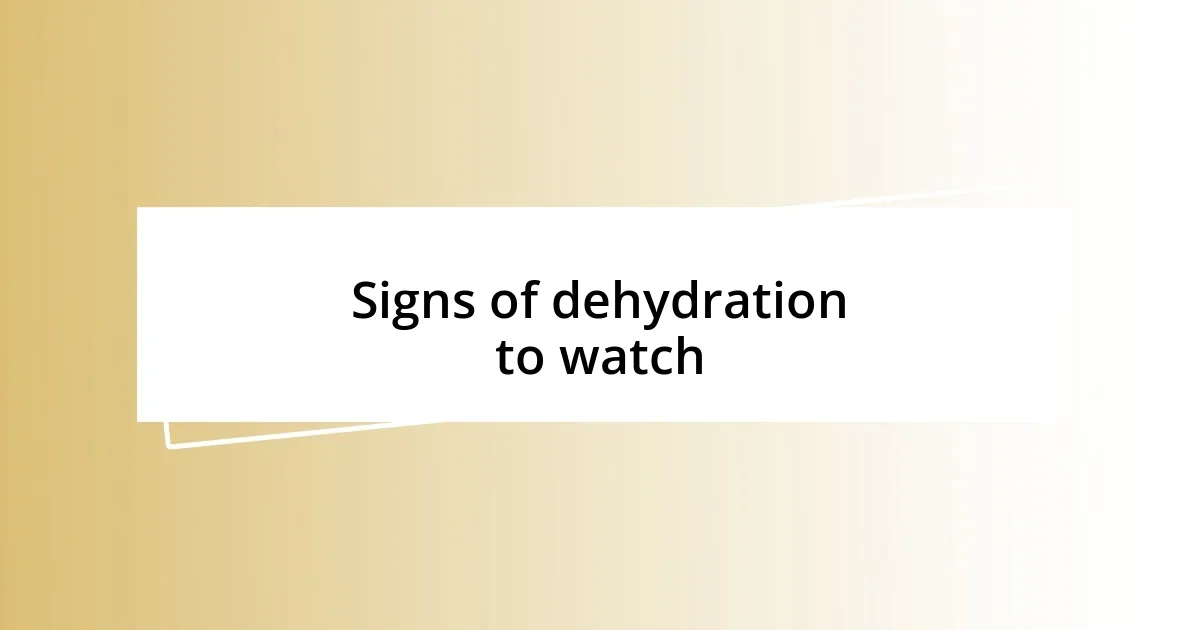
Signs of dehydration to watch
The signs of dehydration can sneak up on you, often in subtle ways before they escalate into something more serious. I remember a particularly grueling day when I had back-to-back meetings and completely forgot to drink water. That afternoon, I noticed my mouth felt dry and my concentration began to wane. It’s amazing how our bodies send us these signals if we just take a moment to listen.
Here are some key signs of dehydration you should keep an eye on:
- Dry Mouth and Thirst: One of the first indicators; it’s your body’s way of signaling that it needs more fluids.
- Fatigue or Dizziness: Feeling unusually tired or lightheaded can mean you’re not getting enough hydration.
- Dark Yellow Urine: A clear signal that your body needs water—darker urine often indicates dehydration.
- Headaches: I can’t count how many times I’ve experienced a pounding headache after a long day without water.
- Dry Skin: Skin that lacks elasticity can indicate dehydration; I’ve definitely seen my skin feel less supple during hot summer days when I’m not drinking enough.
Paying attention to these signs can help steer you back to your hydration goals.
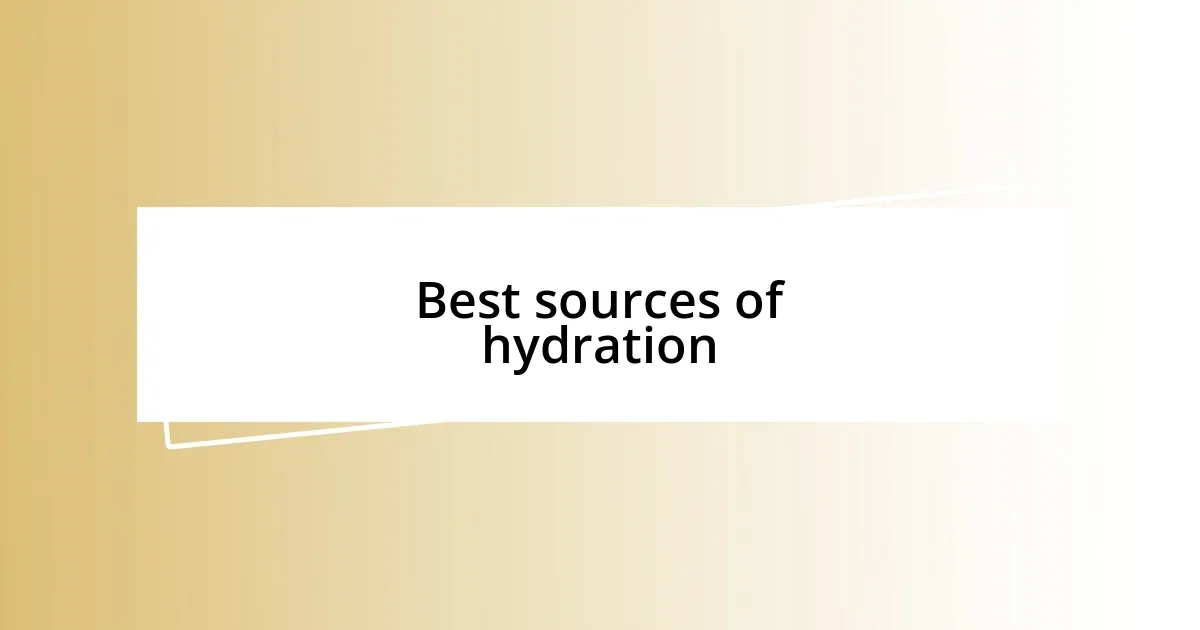
Best sources of hydration
When I think about the best sources of hydration, water is the first thing that comes to mind. I’ve often embraced the simplicity of just reaching for a glass of water throughout the day. But I’ve also discovered that infusing my water with slices of lemon or berries can transform it into a refreshing treat that actually makes me look forward to drinking more. Have you ever experienced that little burst of satisfaction from flavored water? It really can make all the difference.
Beyond plain water, I’ve found that certain foods pack a powerful hydration punch. Cucumbers and watermelon are among my favorites. Just the other day, I indulged in a refreshing cucumber salad during a warm afternoon, and I could practically feel the hydration seeping into my skin. It’s remarkable how those high-water-content foods can support overall hydration while adding nutrition to my diet. Can you remember the last time a juicy watermelon quenched your thirst?
I can’t overlook beverages like herbal teas, either. They’ve become a cozy ritual for me, especially on chilly evenings. When I sip on a warm cup of chamomile or mint tea, it’s not only hydrating but also soothing—a gentle way to unwind. Have you ever thought about how much a simple cup of tea can do? It’s surprising how these delightful options can enhance hydration while also elevating my mood.
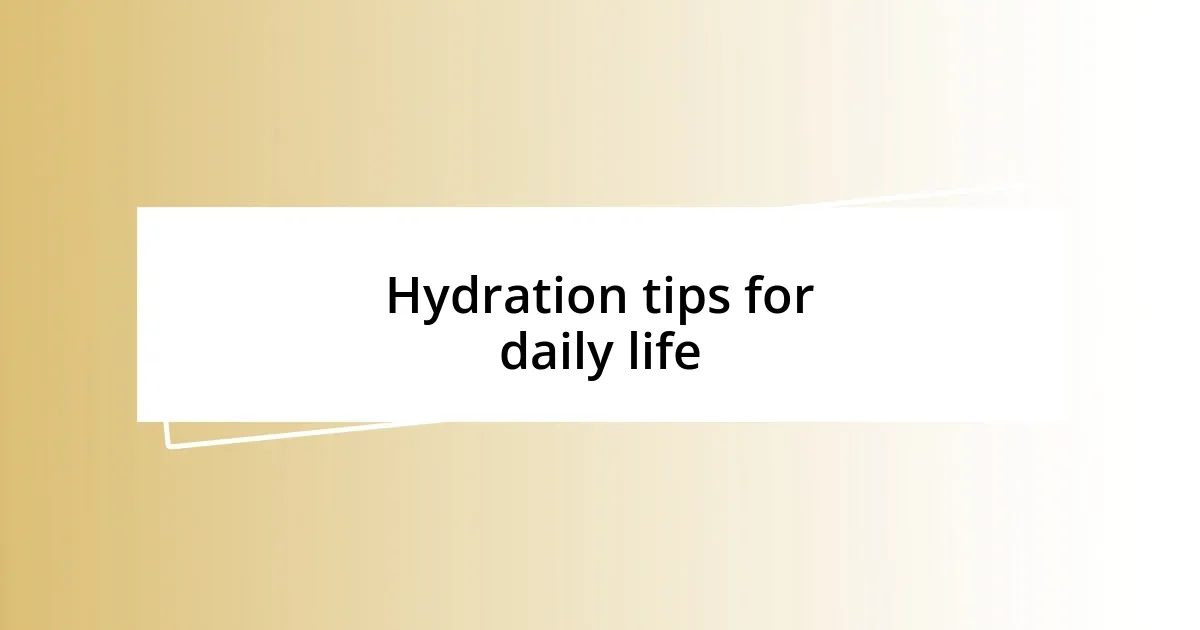
Hydration tips for daily life
Staying hydrated can be surprisingly simple, yet it requires a little intentionality. One habit that I’ve found incredibly effective is to carry a reusable water bottle wherever I go. It serves as a constant reminder to sip throughout the day. I even set a timer on my phone every hour as a gentle nudge to take a few gulps. Have you ever noticed how easy it is to forget about drinking water when you’re engrossed in tasks?
I also like to create a charming little morning ritual. Each day, I start with a glass of warm water with lemon—it’s invigorating and kickstarts my metabolism. There’s something about that first sip that makes me feel refreshed and ready to tackle the day. Have you ever tried that morning hydration boost? It’s a game changer!
Another tip that has really transformed my hydration habits is pairing it with meals. I always make a point to drink a glass of water with lunch and dinner. Not only does it help digest my food better, but it also keeps me from reaching for sugary drinks. I’ll never forget the time I swapped soda for water during a family gathering, and surprisingly, I felt lighter and more energetic afterward. Can you relate to that feeling of clarity after making a simple change? It really does add up over time!
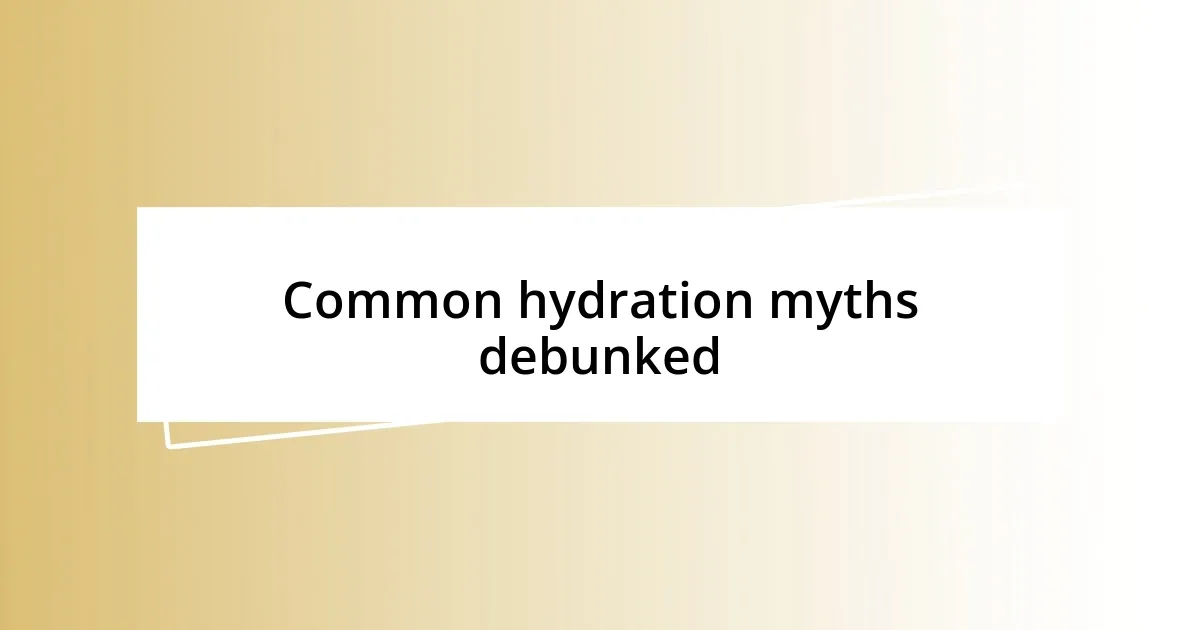
Common hydration myths debunked
Hydration myths can be surprisingly deceptive, and I’ve fallen for a few myself. One that often catches people off guard is the belief that all drinks are equally hydrating. I used to think that my daily coffee or sugary sodas contributed significantly to my hydration needs, but I soon realized that caffeine and sugar can have a dehydrating effect. Have you ever felt that post-soda slump? It’s a subtle reminder that some beverages can actually hinder our hydration goals.
Another common misconception revolves around the amount of water we should be drinking daily. The old guideline of eight glasses a day might not suit everyone. I’ve come to understand that factors like activity level, climate, and even diet play huge roles in our hydration needs. For instance, during a particularly active summer weekend hiking, I noticed I was thirstier than ever, and my body clearly demanded more. How do you gauge your own hydration needs when the weather changes or you exercise more?
Additionally, many believe that drinking fluids late in the evening will disrupt sleep with frequent trips to the restroom. I’ve found, however, that sipping water before bed, in moderation, actually promotes better sleep for me. Too often, we focus on avoiding discomfort rather than listening to our bodies. Have you experimented with your hydration timing? You might uncover surprising benefits that enhance your overall well-being.









